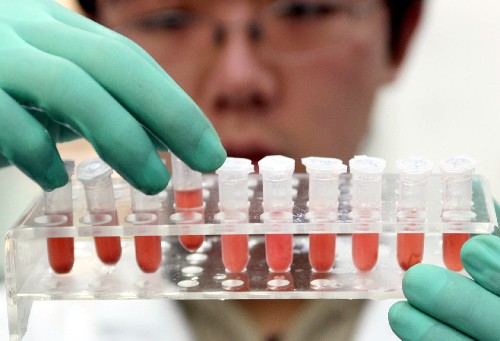

 |
| Researcher does experiment in the lab. (Photo/gov.cn) |
A group of Chinese scientists have made significant progress in the research of anti-MERS drugs.
From 2013 to 2014, Jiang Shibo and his colleagues from the School of Basic Medicine of Fudan University designed and tested an anti-MERS polypeptide called HR2P. They found HR2P can effectively restrain infectivity of MERS-CoV. Jiang and his group then got a new polypeptide HR2P-M2 through researching and upgrading HR2P, which is much better in stability, solubility, antiviral activity and broad-spectrum activity.
They worked together with coronavirus experts to test HR2P-M2 on animals to see its treatment effects. It turned out that HR2P-M2 can protect animals from the attack of MERS-CoV.
Relative papers on the research have been accepted by an international infectious disease magazine, and will be published soon.
Jiang Shibo told journalists that based on the results of the research, this polypeptide can be used through nasal cavity as mist spray for emergency prevention. It can also be used on MERS-infected patients to control the infection source.
 J-11 fighters in air exercise
J-11 fighters in air exercise Beauties dancing on the rings
Beauties dancing on the rings Attendants-to-be join Mr. & Miss Campus Contest
Attendants-to-be join Mr. & Miss Campus Contest Beijing's toughest anti-smoking law takes effect
Beijing's toughest anti-smoking law takes effect Family lives in cave for about 50 years in SW China
Family lives in cave for about 50 years in SW China PLA soldiers operating vehicle-mounted guns in drill
PLA soldiers operating vehicle-mounted guns in drill Blind carpenter in E China's Jiangxi
Blind carpenter in E China's Jiangxi China hosts overseas disaster relief exercise for the first time
China hosts overseas disaster relief exercise for the first time 20 pairs of twins who will become flight attendants in Sichuan
20 pairs of twins who will become flight attendants in Sichuan Obama is sowing discontent in S.China Sea
Obama is sowing discontent in S.China Sea Rescuers work through night to reach cruise ship survivors
Rescuers work through night to reach cruise ship survivors Driving through limbo
Driving through limbo Facing down MERS
Facing down MERSDay|Week